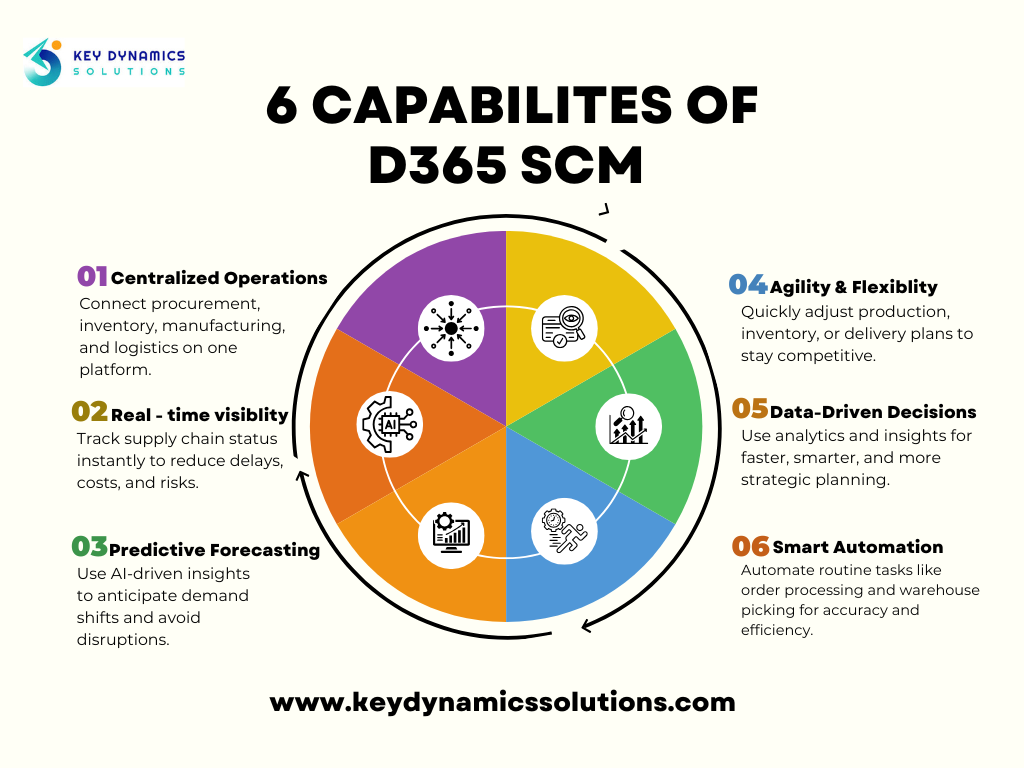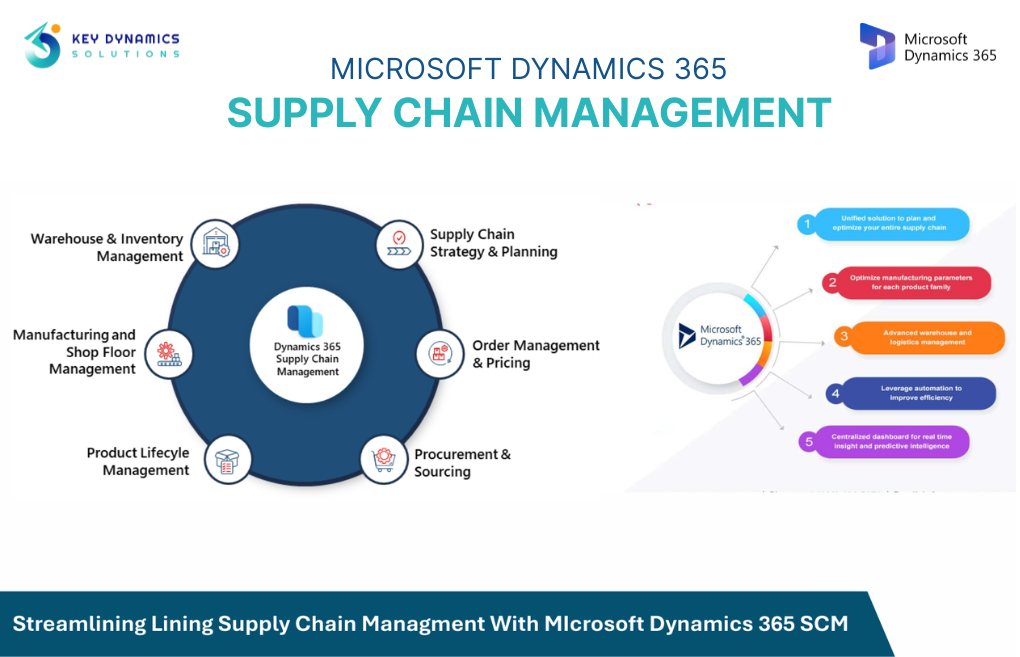Introduction
Global supply chains are facing unprecedented challenges. Demand is unpredictable, disruptions are frequent, and customer expectations are higher than ever. To keep up, businesses can no longer rely on outdated systems. They need platforms that are flexible, intelligent, and connected.
This is exactly what Dynamics 365 Supply Chain Management (D365 SCM)—also known as Microsoft Dynamics 365 supply chain management—delivers. It provides companies with the ability to turn traditional operations into agile, data-driven supply chains. Let’s explore what makes Dynamics 365 SCM so impactful and how it is reshaping supply chain management today.
What is Dynamics 365 Supply Chain Management?
At its core, Dynamics 365 SCM is Microsoft’s cloud-based solution designed to integrate every part of the supply chain. It connects procurement, production, inventory, logistics, and asset management into one unified platform.

Unlike older systems that work in silos, Microsoft Dynamics 365 supply chain management links directly with other Microsoft tools like Dynamics 365 Finance, Power BI, and Teams. This creates an intelligent ecosystem where data flows seamlessly, helping teams make better decisions in real time.
Key Capabilities of Dynamics 365 SCM
Procurement and Sourcing
With D365 SCM, organizations can streamline supplier onboarding, automate purchase requisitions, and evaluate vendor performance more effectively. This leads to stronger supplier relationships and better cost control.
Inventory and Warehouse Management
One of the biggest challenges businesses face is maintaining the right stock levels. Dynamics 365 SCM provides real-time visibility across warehouses and locations. This helps reduce overstocking, prevent shortages, and ensure smoother order fulfillment.
Production and Manufacturing
The system supports different manufacturing approaches, whether discrete, process, or lean. With IoT integration, production managers gain better insights into shop floor activities, allowing them to optimize schedules and minimize downtime.
Transportation and Logistics
Efficient delivery is key to customer satisfaction. Microsoft Dynamics 365 supply chain management helps businesses plan routes, choose carriers, and monitor shipments to cut costs and reduce delays.
How Dynamics 365 SCM Transforms Supply Chains?
Real-Time Visibility
Managers no longer have to wait for end-of-day reports. With D365 SCM, they can track inventory levels, production progress, and shipping status instantly. This kind of visibility allows for faster responses when issues arise.
Predictive Planning
The system uses AI to forecast demand and identify risks. Instead of relying only on past trends, businesses can run “what-if” scenarios to see how changes in demand or supply will affect outcomes.
Smarter Automation
Routine tasks like order processing or warehouse picking can be automated, freeing up staff for more strategic work. This not only reduces human error but also speeds up operations across the board.
Greater Agility
When disruptions occur, agility matters most. Microsoft Dynamics 365 supply chain management enables companies to quickly adjust plans, reroute deliveries, or switch suppliers without losing momentum.
Business Benefits of Adopting D365 SCM
Companies adopting Dynamics 365 SCM often see measurable improvements. Operations become more efficient, costs go down, and customers receive better service. With cloud scalability, organizations can expand quickly without the burden of heavy IT investments.
Perhaps most importantly, decision-making improves. Executives and managers gain access to dashboards and real-time insights, helping them act proactively rather than reactively. The result is a supply chain that is not only more resilient but also more aligned with long-term growth goals.
Best Practices for Implementation
Start with a Roadmap
Businesses should begin by analyzing their current processes and identifying areas where D365 SCM can bring the most value. A phased rollout often works best.
Focus on Data Quality
Clean, consistent data is critical. Before migration, companies should review and standardize product, supplier, and inventory information.
Train Teams Early
Adopting a new system requires change. Training employees and involving them in the transition helps drive adoption and minimize resistance.
Pilot Before Scaling
Launching D365 SCM in one warehouse or plant first allows teams to refine workflows before expanding the system organization-wide.
The Future of Supply Chain with Dynamics 365 SCM
The supply chain of tomorrow will look very different from today. Microsoft Dynamics 365 supply chain management is already moving toward more advanced AI, digital twins for simulation, and deeper IoT integration. Sustainability is also becoming central, with tools to measure and reduce carbon footprints gaining importance.
With its flexible and modular design, D365 SCM can evolve with these changes. Companies adopting it now are not just solving today’s challenges—they are preparing for the supply chain of the future.
Conclusion
Modern supply chains demand speed, intelligence, and adaptability. Dynamics 365 Supply Chain Management (D365 SCM) gives organizations exactly that. By uniting procurement, manufacturing, inventory, and logistics in one connected system, it allows businesses to work smarter, reduce risk, and serve customers better.
For any company looking to future-proof its operations, adopting Microsoft Dynamics 365 supply chain management is not just an upgrade—it’s a strategic move toward resilience and growth.
Read Also: The Future Is Responsive AI in Supply Chain Management

 Logistics
Logistics  Life Science
Life Science  Healthcare
Healthcare Services
Services Manufacturing
Manufacturing  Banking & Finance
Banking & Finance Retail
Retail E-Commerce
E-Commerce Finance
Finance Supply Chain Management
Supply Chain Management Sales
Sales Customer Service
Customer Service Field Service
Field Service Project Operation
Project Operation Marketing
Marketing Human Resources
Human Resources Business Central
Business Central Data Integration
Data Integration Data Warehousing
Data Warehousing Data Analytics
Data Analytics Data Visualization
Data Visualization Data Governance
Data Governance Big Data
Big Data Looker Studio
Looker Studio Power BI
Power BI Power Apps
Power Apps Power Automate
Power Automate Power Virtual Agents
Power Virtual Agents AI Builder
AI Builder Data Machine Learning
Data Machine Learning Prediction & Forecasting
Prediction & Forecasting BOTs & Virtual Agent
BOTs & Virtual Agent Language Services
Language Services Generative AI
Generative AI Agentic AI
Agentic AI iOS & Android Development
iOS & Android Development Cross-Platform Development
Cross-Platform Development UI/UX Design
UI/UX Design App Testing & QA
App Testing & QA Backend Development
Backend Development